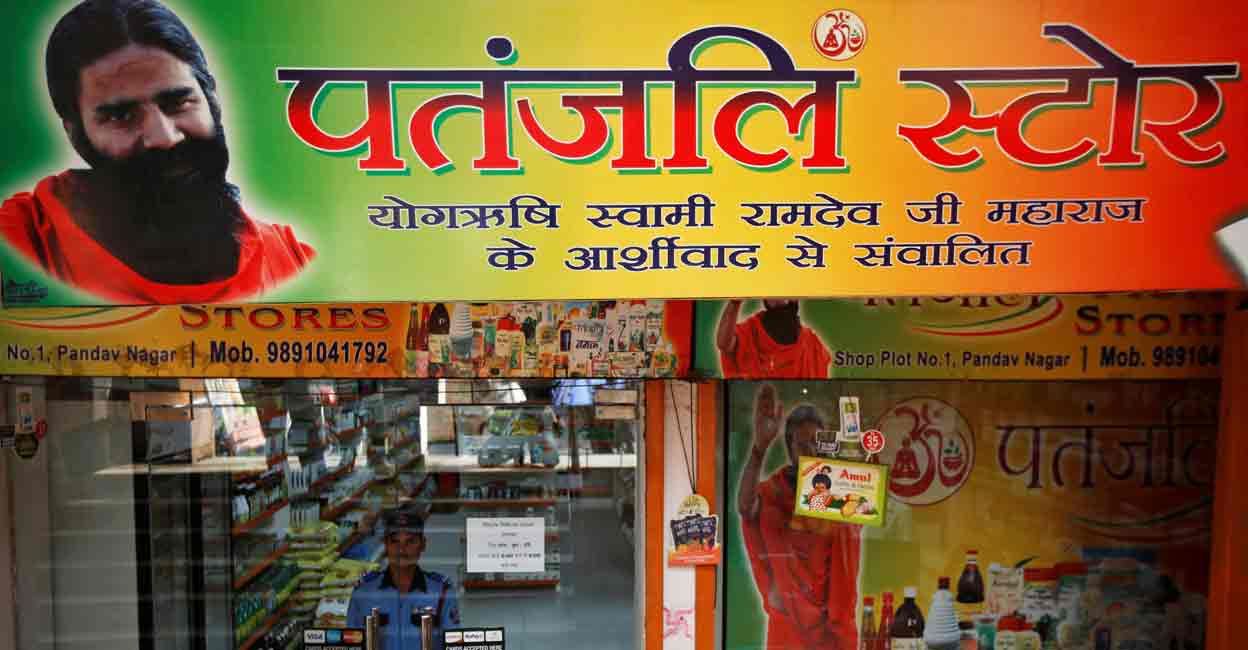Can A Bigger ‘Sorry’ Apology Ad Undo The Fraud Committed By Baba Ramdev’s Patanjali? Why Has The License Not Been Cancelled, And Why Is There No Fine? Should Indian Citizens Forgive Him So Easily?
The controversy surrounding Baba Ramdev's Patanjali has raised questions about the effectiveness of apologies and the consequences of fraudulent practices. The spotlight falls on whether a larger apology advertisement can truly rectify the alleged fraud committed by Patanjali. Equally perplexing is the absence of punitive measures such as license cancellation or fines; why should a fraud committed on such a large scale, and at the expense of our health, should Bab Ramdev get away so easily?

The inquiry into the effectiveness of a prominent apology advertisement in mitigating the damage caused by Patanjali’s misleading advertisements kicks off a broader debate regarding accountability and restitution.
Yoga guru Baba Ramdev and his colleague Balkrishna issued a renewed apology through prominent advertisements in major newspapers on Wednesday. The move came in response to criticism from the Supreme Court, which had noted the inadequacy of their previous apology’s visibility.
In the advertisement, both Ramdev and Balkrishna expressed sincere apologies, both individually and on behalf of Patanjali, for their failure to adhere to the directives of the Supreme Court of India.
Yesterday, Patanjali had issued an apology as well.
However, the Supreme Court questioned its effectiveness, particularly in comparison to the size and impact of the misleading advertisements for its medicinal products.
Patanjali’s latest advertisement, titled “Unconditional Public Apology,” was published this morning, occupying a significant portion of newspaper pages.
It explicitly stated,
“We unconditionally extend the apology for holding meeting/press conference dated 22.11.2023. We earnestly apologize for the mistake made in publishing our advertisements and it is our whole-hearted commitment that such errors will not be repeated.”
Furthermore, in light of the ongoing legal proceedings before the Hon’ble Supreme Court of India (Writ Petition C. No. 645/2022), the advertisement conveyed,
“In our individual capacity as well as on behalf of the Company, we unconditionally apologise for the non-compliance or disobedience of directions/orders of the Hon’ble Supreme Court of India.”

In contrast, the advertisement published yesterday was smaller in size and did not explicitly mention the names of Ramdev and Balkrishna
On April 23, Justices Hima Kohli and A. Amanullah of the Supreme Court inquired whether Patanjali’s apology advertisement had been prominently displayed.
“Has the apology been published prominently? Same font and size as your earlier advertisements?” Justice Kohli inquired during the proceedings.
During Monday’s proceedings in the contempt case against Patanjali Ayurved, the Supreme Court shifted its focus to the practices of the Indian Medical Association and the misleading advertisements published by other consumer companies.
During the Covid pandemic, Patanjali introduced Coronil in 2021, with Ramdev asserting it as the “first evidence-based medicine for COVID-19”. Patanjali claimed that Coronil had been certified by the World Health Organization, but the Indian Medical Association denounced this claim as a “blatant lie”.
Tensions between the medical community and Patanjali escalated when a video surfaced of Ramdev criticizing allopathy as a “stupid and bankrupt science”.
In response, the IMA issued a legal notice to Ramdev, demanding an apology. Patanjali Yogpeeth responded by stating that Ramdev was merely relaying a forwarded WhatsApp message and harbors no hostility towards modern science.
However, the Supreme Court clarified that the issue of misleading advertisements extended beyond Patanjali, including all FMCG firms engaging in such practices.
These advertisements, misrepresenting products, were noted to mislead the public, particularly affecting the health of vulnerable groups such as babies, school-going children, and senior citizens.
Justice Kohli emphasized the scrutiny of the Union government concerning advertisements targeting babies and children.
She urged ministries of consumer affairs, information and broadcasting, and information technology to submit affidavits detailing measures taken to prevent misuse/abuse of consumer laws, along with relevant data since 2018.
The Supreme Court highlighted the need for closer examination of the implementation of relevant provisions of the Drugs and Magic Remedies (Objectionable Advertisements) Act, the Drugs and Cosmetics Act, and the Consumer Protection Act, along with related rules.
Justice Kohli clarified that the court’s focus is not on targeting specific parties or agencies but rather on the larger interest of consumers. The public needs to be aware of potential misleading advertisements and the actions authorities are taking to address them.
Additionally, the Centre was asked to explain its August 2023 letter issued by the Ministry of Ayush to licensing authorities of all states and Union Territories, instructing them to refrain from taking action under Rule 170 of Drugs and Cosmetics Rules, 1945. All licensing authorities of states and UTs were included as parties in the matter.
The suspension of Rule 170 was cited by Patanjali as justification to continue their misleading advertisements.
The bench criticized the Indian Medical Association (IMA) for alleging the continuous spread of misinformation regarding allopathic and modern medicines by Patanjali.
It urged the IMA to rectify unethical practices among its members and criticized them for endorsing expensive and unnecessary allopathic medicines and treatments. The National Medical Commission was also made a party to assist the court.

However, are these actions enough?
While such advertisements may serve to acknowledge wrongdoing and express remorse, they often raise questions about their sincerity and the extent to which they address the harm inflicted on consumers.
In the case of Patanjali, the controversy extends beyond mere apologies.
Allegations of fraud imply deliberate deception and exploitation of consumer trust, and despite the issuance of apologies, concerns persist about the adequacy of corrective measures and the genuine commitment to compliance with regulatory standards.
Moreover, the absence of punitive actions such as license cancellation or imposition of fines raises eyebrows regarding the regulatory response.
Critics argue that without tangible consequences for wrongdoing, there is little deterrent effect, and companies may perceive apologies as a convenient way to evade accountability while continuing questionable practices.
The failure to impose penalties also reflects broader challenges within regulatory frameworks.
It raises questions about the effectiveness of existing laws and enforcement mechanisms in addressing corporate misconduct and safeguarding consumer interests.
Additionally, it highlights potential loopholes or deficiencies in regulatory oversight that may allow companies to operate with impunity.

The Viewpoint
With the tacit support of the Union Ministry and BJP state sponsorship, Patanjali’s dubious practices have thrived, despite the grave consequences for unsuspecting consumers.
The success of their operation seems to have rendered them indifferent to the plight of patients; we should question if any lives are lost due to their fraudulent activities.
Also, the recent developments, including the issuance of apologies and inquiries by the Supreme Court, to simply put is too little, too late.
The damage inflicted by Patanjali’s business fraud is extensive and irreparable. In the eyes of many critics, the appropriate response should involve more severe consequences.
Firstly, the cancellation of Patanjali’s business license is advocated as a necessary step to dismantle their fraudulent operation.
This would entail requiring Patanjali to reapply under stringent regulations, including thorough inspections and adherence to ethical standards and it would also serve as a warning for other companies.

Additionally, why is there no imposition of hefty fines?
Given all the ‘profits’ they have made, a fine amounting to hundreds of crores is deemed essential to hold Patanjali accountable for their actions and deter similar misconduct by other companies in the future.
Such penalties would serve as a punitive measure for their past transgressions and as a deterrent against future malpractices.
The Last Bit, the repercussions of Patanjali’s business fraud extend far beyond financial losses.
They have eroded trust in the healthcare system, endangered public health, and undermined the integrity of regulatory institutions.
Also, the debate surrounding Patanjali’s apology advertisement is nothing but akin to lighting Diya’s and banging utensils to ‘scare’ the pandemic away!
We need to broaden discussions on corporate accountability, regulatory efficacy, and the balance between forgiveness and accountability in addressing instances of fraud and misconduct.




